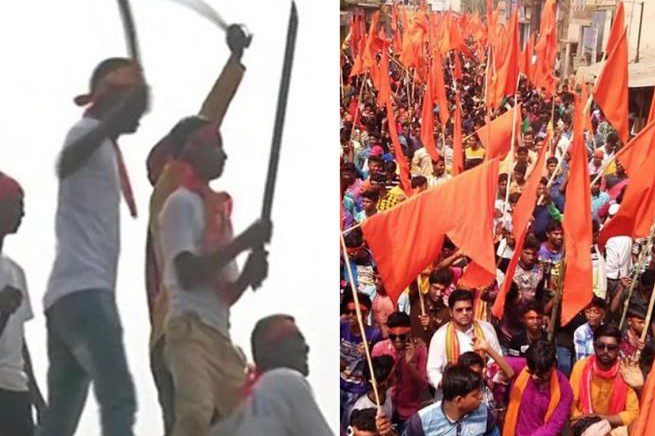Reading Time: 3 minutes
BJP’s allies are abandoning it progressively, triggered by Asansol riots. Here’s a report, for Different Truths.
The restiveness among the BJP’s former and present allies has spread from the Shiv Sena, which was the first to say that it would not align with the BJP in 2019, to Telugu Desam and Hindustani Awam Morcha’s Jitan Ram Manjhi to Nitish Kumar and perhaps even Ramvilas Paswan.
While the Shiv Sena was the first to sense that Narendra Modi’s magic was fading, the Telugu Desam realised that being with the BJP was becoming more of a liability than an asset and, therefore, used the denial of a special package for Andhra Pradesh as the reason for its exit. In the same vein, the nominal trigger for Jitan Ram Manjhi’s revolt was over the allocation of seats for his party in the recent Rajya Sabha elections although he, too, may have seen the ebbing of the earlier pro-BJP tide in view of the RJD’s victory in the Araria Lok Sabha by-poll despite its leader, Laloo Prasad Yadav, being in jail.
Now, Paswan’s invitation to Nitish Kumar to be the chief guest at a function to observe B.R. Ambedkar’s birth anniversary in Patna is being interpreted as a sign that the minister for food and public distribution is reassessing his future in the NDA as he did in Atal Behari Vajpayee’s time after the 2002 Gujarat riots. What may have induced rethinking in the NDA camp is the familiar disadvantage of proximity to the BJP – sporadic communal violence in mofussil towns in which the saffron outfit is believed to play a part.
Given the manner in which the riots have taken place in Asansol in West Bengal where a “Hindu consolidation” is taking place, according to BJP M.P. Subramanian Swamy, and in Bihar and Rajasthan, the vacuity of Modi’s sabka saath, sabka vikas mantra has been exposed. It is obvious that the slogan has little meaning for the Hindutva storm-troopers whose latest gambit for sparking off riots is to use the supposedly festive occasions of Ram Navami or Hanuman Jayanti to chant provocative slogans to prepare the ground for a communal outbreak.
In Bihar, the Nitish Kumar government has finally succeeded in arresting a Union minister, Ashwini Kumar Choubey’s son for allegedly inciting violence in Bhagalpur on the occasion of Ram Navami, but the delay in taking the step and the Union minister’s earlier trashing of the FIR against his son hasn’t enhanced the chief minister’s reputation as sushasan babu or a votary of good governance, not least because of the prevailing tension in towns such as Aurangabad, Nalanda, and Samastipur.
The chief minister is also said to be unhappy with the comments made by another Union minister, Giriraj Singh, that the RJD’s victory in Araria will make the region a hub of terrorists. What he must have realised is that as the communal tension brews in the state, the sole gainer will be his former ally-cum-present foe, the RJD. Hence, the reports that he is considering constituting a block within the NDA comprising, apart from himself, Paswan and the Rashtriya Lok Samata party chief, Upendra Kushwaha (who is a Union minister), to keep the BJP under pressure.
If Nitish Kumar’s fear is that the Muslims will drift away in even larger numbers to the RJD in Bihar, Paswan is probably uneasy about the increasing alienation of the Dalits all over the country even as more and more statues of Ambedkar are being vandalized in U.P., which has an upper caste chief minister. Dalits are known to have been moving away from the BJP – they were never close to the party anyway except in 2014 – ever since the suicide of Rohith Vemula in Hyderabad central university following a confrontation with the Akhil Bharatiya Vidyarthi Parishad (ABVP), the BJP’s student wing, and the lynching of four Dalits by gau rakshaks in Una in Gujarat.
That Modi’s home province remains a hotbed of saffron violence is evident from the recent killing of a Dalit youth by upper caste men for the “offence” of owning and riding a horse. Incidents such as these, including the attacks on the statues of Periyar in Tamil Nadu, have led to the emergence of the GenNext of Dalit leaders like Jignesh Mewani. At the same time, the BSP’s czarina, Mayawati, has refashioned her brand of politics by aligning with Akhilesh Yadav, putting aside her two-decade-old enmity with the Samajwadi Party (SP).
All of these are significant straws in the political wind for the BJP’s allies, including the electoral successes of the party’s opponents in two perceived saffron strongholds in U.P. recently which has made another of the BJP’s allies, Union minister of state for social justice Ramdas Athawale, who is a Dalit, say that the SP-BSP alliance may cost the BJP 25-30 seats in the state.
The possibility may have induced the state’s chief minister, Yogi Adityanath, to think of introducing quotas within the quotas for Dalits and backward castes to wean away the extremely marginalised sections of these caste groups from the SP and the BSP. However, such manoeuvres are unlikely to succeed if the anti-BJP trends are strong enough, as they seem at present.
Amulya Ganguli
©IPA Service
Photo from the Internet

















